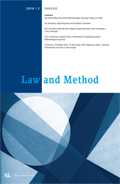|
Scholars who set out to study the European Convention on Human Rights (ECHR or Convention) system will find an abundance in research methods to choose from. In the early years of the European Court of Human Rights (ECtHR or Court), the methodological toolbox of the ECHR scholar largely consisted of qualitative and classical-doctrinal methods to study the Court’s case law, as well as historical, philosophical and theoretical studies to contextualize the ECHR system. Today, these ‘traditional’ methods not only have evolved to reflect the enormous increase of, and scholarly interest in, the Court’s case law but have also been complemented by empirical qualitative and quantitative, statistical and machine learning research methods. This contribution traces these major developments in the methods applied to studying the Court. By providing a comprehensive discussion of the different approaches, including their application, value and potential weaknesses, this contribution helps scholars understand, use and learn from the rich methodological toolbox of the ECHR scholar. |


Law and Method
About this journalSubscribe to the email alerts for this journal here to receive notifications when a new issue is at your disposal.
February, 2023
Expand all abstracts
| Artikel |
|
| Keywords | ECHR, ECtHR, methods, legal progress |
| Authors | Janneke Gerards, Elif Erken and Claire Loven |
| AbstractAuthor's information |

 Issue 11
Issue 11